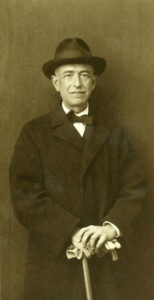
Yesterday’s Music History Monday post offered up a heart-felt happy birthday to the Spanish composer and conductor Manuel María de los Dolores Falla y Matheu (“y Matheu”, because Spaniards customarily add their mother’s maiden surname to their own), who was born on November 23, 1876 in the Andalucían port city of Cadiz. Falla (when only the surname is used the de is omitted) died “in exile” on November 15, 1946 in Alta Gracia, Argentina, eight days short of his 70th birthday. (Falla had fled to Argentina in 1939 after Francisco Franco’s victory in the Spanish Civil War.)
Andalucía – the southernmost region of Spain – is the birthplace of flamenco, a genre of Spanish song and dance that we celebrated together in my Dr. Bob Prescribes post on June 9, 2020. I said it then and I’ll say it again now: in my humble (but well-informed) opinion, flamenco is – along with jazz – the most viscerally exciting music to be found on this planet. I would go so far as to suggest that if Andalucía were a media giant equal to the U.S. of A., we’d all be singing and dancing to flamenco and not that North American-born hybrid called rock ‘n’ roll.
Falla’s parents were not native Andalucíans; his father was from Valencia in eastern Spain and his mother from Catalonia, in northern Spain. Each of these three regions – Andalucía, Valencia, and Catalonia – has its own distinct musical tradition, and we must consider de Falla’s music to be a free mix of all three of his “native” regions.
Falla’s mother was a first-rate pianist and was Manuel’s first music teacher. It’s a familiar story: a musical parent quickly recognizes the prodigious talents of a young child. Señora de Falla entrusted her son’s musical education to the best teacher in Cadiz – in this case, a woman named Eloisa Galluzzo – and so young Manuel’s meteoric development began.
When he was 12 the Falla family moved to Madrid. Manuel was enrolled at the Royal Madrid Conservatory (“Real Conservatorio de Música y Declamación”), where he proceeded to complete a seven-year course of study in two years. A talented kid. He stayed on at the Conservatory, racking up first prizes as a pianist and composer; in 1900 he joined the faculty.
1900 was also the year he dedicated himself to the music of Spain thanks to the Catalonian-born composer, guitarist, musicologist, and teacher Felipe Pedrell (1841- 1922). Pedrell, who was living there in Madrid at the time, taught privately. He had organized a studio modelled on Mily Balakirev’s “Russian Five”, and like The Five, Pedrell’s mission was to create a genuinely “Spanish” national concert music. Later in life, Falla wrote of his teacher:
“To find finally in Spain something which I had only the illusion of knowing since the beginning of my studies, I went to Pedrell’s house to beg him to be my guide. It is to his teaching that I owe the clearest and strongest direction of my work.”
According to Pedrell, the Spanish musician:
“should steep himself in two inexhaustible sources: the lofty Spanish polyphonic tradition, going back to the thirteenth century, and the immense riches of Spanish folklore.”
This Falla did, becoming in the process – along with his contemporaries Isaac Albéniz (1860-1909) and Enrique Granados (1867-1917) – one of the most important Spanish composers of the first half of the twentieth century.…
Continue reading, and see the prescribed recordings, only on Patreon!
Become a Patron!